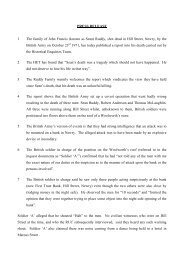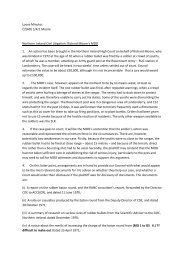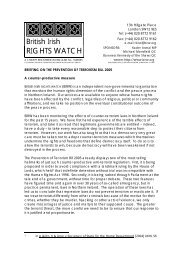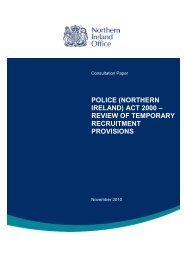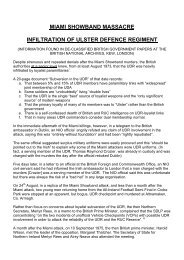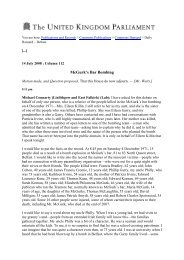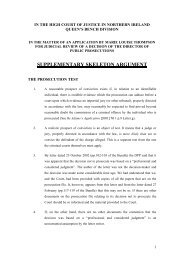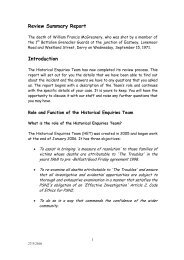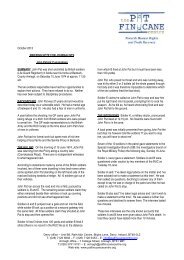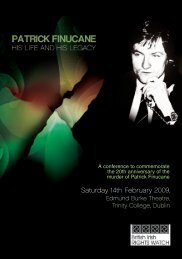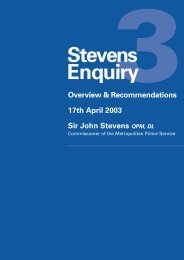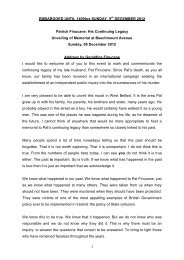Patrick Shanaghan v the United Kingdom - The Pat Finucane Centre
Patrick Shanaghan v the United Kingdom - The Pat Finucane Centre
Patrick Shanaghan v the United Kingdom - The Pat Finucane Centre
Create successful ePaper yourself
Turn your PDF publications into a flip-book with our unique Google optimized e-Paper software.
10 SHANAGHAN v. THE UNITED KINGDOM JUDGMENT<br />
47. <strong>The</strong> forms of verdict used in Nor<strong>the</strong>rn Ireland accord with this<br />
recommendation, recording <strong>the</strong> name and o<strong>the</strong>r particulars of <strong>the</strong> deceased,<br />
a statement of <strong>the</strong> cause of death (e.g. bullet wounds) and findings as to<br />
when and where <strong>the</strong> deceased met his death. In England and Wales, <strong>the</strong><br />
form of verdict appended to <strong>the</strong> English Coroners Rules contains a section<br />
marked “conclusions of <strong>the</strong> jury/coroner as to <strong>the</strong> death” in which<br />
conclusions such as “lawfully killed” or “killed unlawfully” are inserted.<br />
<strong>The</strong>se findings involve expressing an opinion on criminal liability in that<br />
<strong>the</strong>y involve a finding as to whe<strong>the</strong>r <strong>the</strong> death resulted from a criminal act,<br />
but no finding is made that any identified person was criminally liable. <strong>The</strong><br />
jury in England and Wales may also append recommendations to <strong>the</strong>ir<br />
verdict.<br />
48. However, in Nor<strong>the</strong>rn Ireland, <strong>the</strong> Coroner is under a duty (section<br />
6(2) of <strong>the</strong> Prosecution of Offences Order (Nor<strong>the</strong>rn Ireland) 1972) to<br />
furnish a written report to <strong>the</strong> DPP where <strong>the</strong> circumstances of any death<br />
appear to disclose that a criminal offence may have been committed.<br />
49. Until recently, legal aid was not available for inquests as <strong>the</strong>y did not<br />
involve <strong>the</strong> determination of civil liabilities or criminal charges. Legislation<br />
which would have provided for legal aid at <strong>the</strong> hearing of inquests (<strong>the</strong><br />
Legal Aid, Advice and Assistance (Nor<strong>the</strong>rn Ireland) Order 1981, Schedule<br />
1 paragraph 5) has not been brought into force. However, on 25 July 2000,<br />
<strong>the</strong> Lord Chancellor announced <strong>the</strong> establishment of an Extra-Statutory Ex<br />
Gratia Scheme to make public funding available for representation for<br />
proceedings before Coroners in exceptional inquests in Nor<strong>the</strong>rn Ireland. In<br />
March 2001, he published for consultation <strong>the</strong> criteria to be used in deciding<br />
whe<strong>the</strong>r applications for representation at inquests should receive public<br />
funding. This included inter alia consideration of financial eligibility,<br />
whe<strong>the</strong>r an effective investigation by <strong>the</strong> State was needed and whe<strong>the</strong>r <strong>the</strong><br />
inquest was <strong>the</strong> only way to conduct it, whe<strong>the</strong>r <strong>the</strong> applicant required<br />
representation to be able to participate effectively in <strong>the</strong> inquest and whe<strong>the</strong>r<br />
<strong>the</strong> applicant had a sufficiently close relationship to <strong>the</strong> deceased.<br />
50. <strong>The</strong> Coroner enjoys <strong>the</strong> power to summon witnesses who he thinks it<br />
necessary to attend <strong>the</strong> inquest (section 17 of <strong>the</strong> Coroners Act) and he may<br />
allow any interested person to examine a witness (Rule 7). In both England<br />
and Wales and Nor<strong>the</strong>rn Ireland, a witness is entitled to rely on <strong>the</strong> privilege<br />
against self-incrimination. In Nor<strong>the</strong>rn Ireland, this privilege is reinforced<br />
by Rule 9(2) which provides that a person suspected of causing <strong>the</strong> death<br />
may not be compelled to give evidence at <strong>the</strong> inquest.<br />
51. In relation to both documentary evidence and <strong>the</strong> oral evidence of<br />
witnesses, inquests, like criminal trials, are subject to <strong>the</strong> law of public<br />
interest immunity, which recognises and gives effect to <strong>the</strong> public interest,<br />
such as national security, in <strong>the</strong> non-disclosure of certain information or<br />
certain documents or classes of document. A claim of public interest<br />
immunity must be supported by a certificate.



